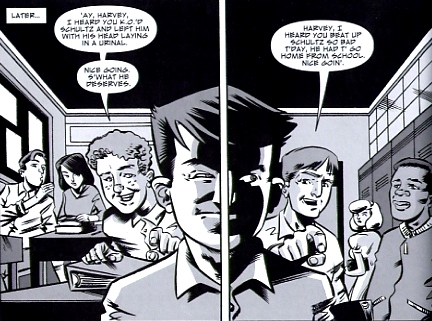Quitting Time
Harvey Pekar died six years ago. In 2005, when he was 65, he came out with one of his last comic books, The Quitter, which I just got around to reading. Much of his work as a comics writer (others did the illustrations) dealt with autobiography, but this is the first time he's gone deeply into his early years. Essentially, The Quitter is the first few chapters of his story.
His parents were Jewish immigrants from Poland, and Harvey grew up in Cleveland speaking Yiddish at home and English on the streets. He didn't easily relate to his folks who sometimes seemed bewildered by this new world. Harvey worried about the opinions of his peers, and grew up as a tough guy--a regular street fighter. He was on the football team in high school, but when the coach didn't play him enough, he quit.
This was a pattern in his life, and gives us the book's title. He didn't mind working at something, but could get easily discouraged. And when things weren't going his way he didn't know how to respond. When he graduated from high school, he tried the Navy, but when he was unsure of something as basic as how to clean his clothes, he became practically catatonic. He went to see the military psychologist, and was sent home. He tried college, and did well at first with his photographic memory. But when things got hard, once again he panicked and quit.
On the side, he became a jazz aficionado, and before he turned twenty was a published music critic (even if he wasn't getting paid yet--that would come a few year later when he wrote for Down Beat, and even then it wasn't very much).
Pekar went through a lot of low-paying jobs, but with no seeming ambition and a violent temper, his father finally had enough and threw him out. He worked at a job in a record warehouse and moved into a spot in a dicey area of Cleveland. He eventually lost his new position because he horsed around too much, and so started another series of jobs, finally ending up as a file clerk for the federal government, which he'd do until retirement.
He also got married while young but that fizzled out. Meanwhile, he met R. Crumb, who'd go on to become the world's top underground cartoonist. Pekar thought there was a lot that could be done in the medium, and eventually started writing his own comics. Crumb and others did the drawings and Harvey became a semi-celebrity, but still wasn't making much money. He also continued writing for magazines, and continued to fret over all the details of his life (if his comics are anything to go by).
The book is like a lot of Pekar--he believes, if looked at honestly, real life is as dramatic as anything in the movies. Harvey may have been neurotic, and a bit of a nudnik, but he wasn't that much worse (or better) than most people you meet. And The Quitter helps fill in the part of the story that Pekar fans have often wondered about.



0 Comments:
Post a Comment
<< Home